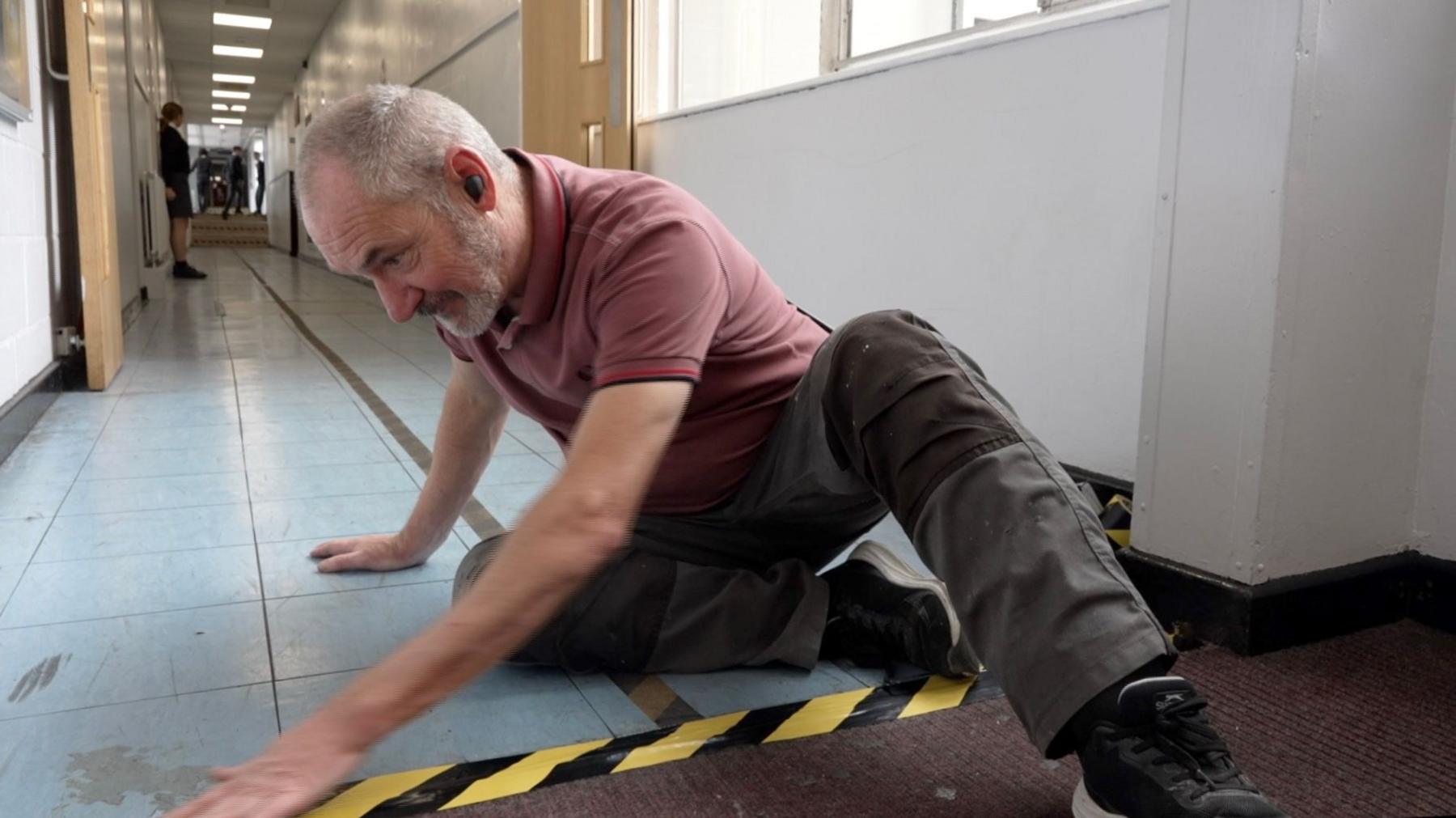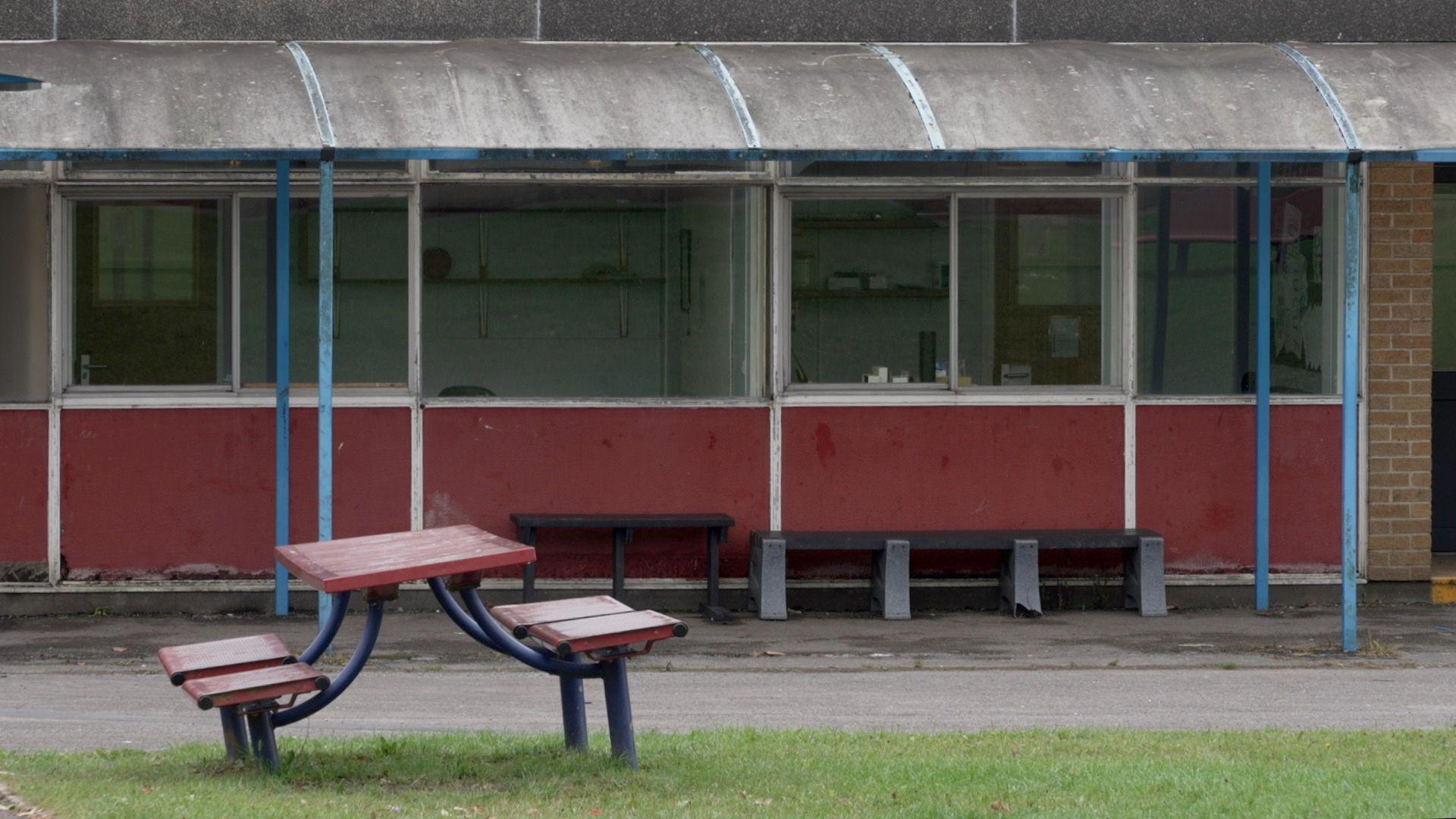'The lights go out when it rains' - hundreds of schools waiting on builders

The vast majority of schools on a government rebuilding programme in England are waiting for builders, according to a Freedom of Information request.
- Published
Hundreds of old and leaky school buildings in England still don’t have builders assigned to them - even though they’re on a flagship government rebuilding programme, the BBC has found.
More than 500 schools are on the scheme, but by this summer contracts had been awarded to construction companies to rebuild just 62 of them.
The BBC has been looking into why targets are being missed. Industry experts have told us construction companies are nervous about taking on contracts in case costs exceed their budgets.
But the Department for Education (DfE) says the programme is on track and forecasts were made before high inflation hit the construction industry.
'Our school has been crumbling for 20 years'
- Published21 March 2024
Successful school building bids drop to record low
- Published26 March 2024
Crumbling concrete schools will suffer ‘for years to come’
- Published2 September 2024
The School Rebuilding Programme, announced in 2020, aims to rebuild or refurbish about 500 schools in a decade.
Construction was due to start in 2021 at a rate of about 50 schools per year.
However, according to the National Audit Office (NAO),, external the DfE forecast last year that it would complete fewer projects than it had initially planned.
The BBC has found 23 schools have been completed so far and a further 490 are still waiting. Most do not yet have builders on board.
The DfE originally projected, external that 83 contracts would be awarded by March 2023.
However, its response to a BBC Freedom of Information (FOI) request revealed only 62 had been issued by June 2024.

Patchway Community School's rebuild has been delayed by at least a year, according to the head of its trust.
Patchway Community School in Bristol was selected for the School Rebuilding Programme in 2021, but is still waiting to be assigned a construction company.
"Sometimes when it's raining, the light malfunctions and you can barely see anything," said Year 8 student Faizah.
"When we play games like dodgeball or basketball, some of the balls get stuck up in the roof because of the holes," said Logan, also in Year 8.
Dave Baker, the chief executive officer of The Olympus Academy Trust, which runs Patchway, said the cracked ceiling in the school gym, like other areas of wear and tear, was "not worth replacing, because the whole thing is going to be knocked down within the next two years".

Dave Baker says Patchway is seen as the "poor neighbour" of others in the trust that have been built in recent years.
He said the rebuilding process had been delayed by at least a year, after a company that had signed up to rebuild Patchway pulled out.
"The contractors, it seems, felt that they couldn't deliver the building to the specification for the money that was available. That's our interpretation of what happened," he said.
"I feel that there are young people and their families who have been let down - and that’s not OK."
Mr Baker now hopes to have a new contract in place in the coming weeks, and a new school with "the best facilities in the area" in 2027.
Building company Wates told the BBC it worked "extensively" with the DfE and had provided design services for Patchway, but the DfE "decided on this occasion not to proceed with Wates for the building work".

All bar one of Patchway Community School's buildings, which Mr Baker thinks date back to the 1950s, are set to be demolished.
Rebecca Larkin, from the Construction Products Association, which represents manufacturers, said while a lag between the announcement of the School Rebuilding Programme and getting spades in the ground was to be expected, it was still running behind.
"It is not coming through as quickly or on the schedule that was originally promised by the government," she said, adding that she would have expected about 100 contracts to have been awarded by now.
Ms Larkin said high inflation may have made building companies "reticent" to take on contracts.

Rebecca Larkin says inflation has soared in the construction industry since the Covid pandemic.
"Construction contractors typically operate on very small margins, so if they sign up to a contract and then prices rise during the construction work, there is very little room for manoeuvre," she said.
"Given that there are fixed capital budgets in all government departments, there is very little room for them to manoeuvre as well, so you're in a kind of Catch-22 situation."
Ms Larkin said updates on the programme were "very infrequent".
Extra funding would help, she said, but the DfE was competing with other government departments for bigger budgets.
Others told the BBC the recent collapse of construction company ISG, which had already started work on at least one school on the School Rebuilding Programme, could make it even harder for the DfE to find companies to take on the work.
Parents taking children out of Raac schools - union
- Published24 January 2024
Raw sewage leaks and asbestos in England's schools
- Published28 June 2023
The schools on the School Rebuilding Programme are those the DfE has deemed as being most in need.
However, the NAO report last year said funding levels in England had contributed to the "deterioration" of the wider school estate - and 24,000 school buildings (38% of the total) were beyond their initial life design.
James Ludlow, principal at Joseph Leckie Academy in Walsall, said he spent £10,000 of the school's budget refurbishing its 1930s school hall this summer because he became "fed up" with the peeling paint and damp.
"We're having to spend a lot of money on patching things up," he said.
The NAO report also said the "slower than planned" progress of the School Rebuilding Programme was "largely due to construction providers not taking up contracts".
It said the DfE had "taken steps to address these issues, including by changing its approach to project funding policy to reflect market conditions".
The DfE told the BBC the programme was on track, and its original forecasts were made before events including Russia’s invasion of Ukraine affected industry prices.
It said schools take an average of two to five years to build, and that some form of work had started at just under half of the projects - although it did not specify what type of work.
In a statement, education minister Stephen Morgan said the government "inherited a school estate in need of urgent repair... and without a comprehensive plan" - and that this would "not be a quick fix".
Additional reporting by Kevin Core.

Listen to Hazel Shearing's documentary Old School Problems at 13:30 BST on Sun 13 Oct and at 16:00 BST on Mon 14 Oct on BBC Radio 4. Or catch up later on BBC Sounds.